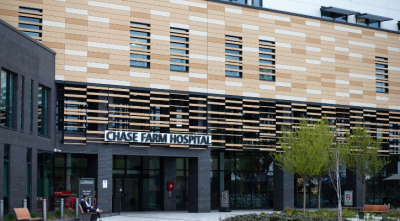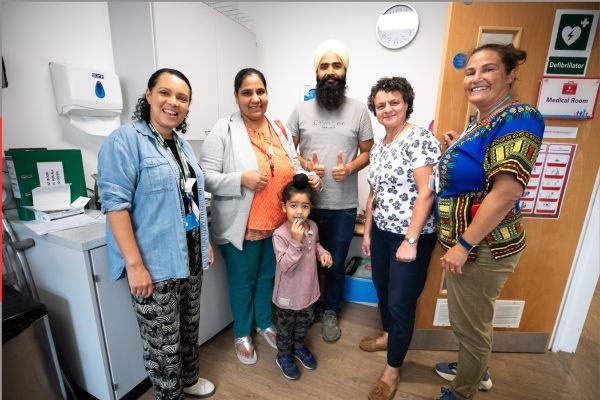Speech and language therapy (SALT) is one of the types of therapy we use at the Royal Free London. It is designed to help patients with communication or swallowing problems that are physically based.
People with a wide variety of conditions can be helped by a speech and language therapist, from those with vocal disorders like a stammer to patients with serious neurological conditions like stroke.
Speech and language therapists at Barnet Hospital and Chase Farm Hospital are specialists in assessing, diagnosing and managing patients.
Our therapists assess and treat patients with a range of conditions, including the following:
- swallowing problems that have a neurological or physical nature
- communication or swallowing problems associated with tracheostomy
- speech and language difficulties due to a neurological disorder (eg Parkinson's disease, dementia, stroke, motor neurone disease)
- assessment and treatment for voice disorders, like stammer
- swallowing or communication difficulties due to cancers of the head or neck, like throat cancer.
Speech and language therapists are key members of a therapeutic team that collaborates across departments at the Royal Free London Trust to provide the best possible patient care. The team includes physiotherapists, occupational therapists and dieticians.
This type of combined approach is especially beneficial for patients affected by neurological disorders and those with tracheostomy or suffering from stroke.
Our speech and language therapists work within multidisciplinary teams, particularly in the following areas:
- neurosciences (neurology, neurosurgery, stroke)
- critical care
- health services for the elderly
- oncology and palliative care.
We provide rehabilitation of communication and swallowing disorders for inpatients who need our support as part of their multidisciplinary treatment.
Also visit our neuro speech and language therapy page, to see how our speech and language therapists treat neurological patients.
Therapists assess and treat adult patients who are admitted to the Royal Free Hospital with a range of conditions, including:
- Swallowing problems that have a neurological or physical nature.
- Providing diet/fluid modifications for people with swallowing disorders.
- Communication or swallowing problems associated with tracheostomy.
- Speech and language difficulties due to a neurological disorder (eg Parkinson's disease, dementia, stroke, motor neurone disease).
- Swallowing or communication difficulties with adults with learning disabilities (eg Down's syndrome, cerebral palsy).
- Swallowing or communication difficulties due to cancers of the head or neck.
- Instrumental assessment such as videoflouroscopic swallow study (VFSS) and fiberoptic endoscopic evaluation of swallow (FEES) for patients with swallowing disorders (inpatients only).
At the Royal Free Hospital, speech and language therapy services are provided via the following three pathways:
Speech and language therapists working under complex medical and surgical teams specialise in the assessment and treatment of communication and swallowing disorders, and weaning support for patients with tracheostomies.
Areas covered by the team include complex medical wards such as the intensive care unit, respiratory, cardiac, liver, infectious disease and surgical wards.
Speech and language therapy services include swallowing and communication support for elderly patients, with specialised knowledge of the ageing swallow.
The team works to support patients with conditions such as dementia, Parkinson’s disease and other neurodegenerative/age-related disorders.
The neurological speech and language therapy team specialise in assessing and treating swallowing and communication difficulties in patients who have an acquired neurological condition, with an emphasis on stroke rehabilitation.
Instrumental swallow assessments (inpatients only)
Admitted patients who are referred to instrumental assessment for detailed evaluation of their swallow are assessed in the X-ray department (for videoflouroscopy) or at their bedside (for fiberoptic endoscopic evaluation of swallowing) by the speech and language therapist.
After the completion of the assessments, a report is written and feedback is given to the patient, along with further recommendations, eg modified diet/fluids, swallow rehabilitation exercises or onward referral to other services such as ear, nose and throat, or the nutrition team.
Patients requiring ongoing speech and language therapy
Patients who require ongoing speech and language therapy beyond their hospital admission will be referred to their relevant community speech and language therapy service/rehabilitation facility or outpatient clinic as appropriate.
If an individual (not an inpatient) has concerns about their communication or swallow ability, they are advised to request a community speech and language therapy review via their GP practice.
At Barnet Hospital, Chase Farm Hospital and the Royal Free Hospital, referrals are accepted only from Royal Free London consultants via EPR.
 Translate
Translate




